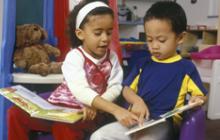Toxic Stress: How Economic Inequality Hurts Early Childhood Development
The achievement gap between children from low-income backgrounds and their affluent peers has increased by 40 percent over the last three decades. The impact of this economic disparity can become apparent in children as young as 9 months. By the time children from lower-income backgrounds turn 3, for example, they will have heard 30 million fewer words than those from higher-income families. Such setbacks can hurt young children’s language development and, in turn, curb their achievement from kindergarten to the workforce.
On July 30, 2015 AIR hosted an event examining the ways economic inequality can constrain young children’s learning opportunities. Guest presenter C. Cybele Raver reviewed the neuroscience of early socioemotional development in the context of toxic stress: frequent or prolonged adversity stemming from economic hardship, abuse, neglect, and poor caregiver mental health. Dr. Raver also shared evidence from recent evaluations of early interventions and discuss what we may do to mitigate the detrimental effects of toxic stress stemming from poverty.
Watch a recording of the full event:
Welcome
David Myers
President and CEO, AIR
Presenter
C. Cybele Raver
Vice Provost for Research and Faculty Affairs, New York University
Discussants
Emmalie Dropkin
Director of Policy, Data and Research, National Head Start Association
Eboni Howard
Managing Researcher, AIR
Moderator
Christina A. Samuels
Staff Writer, Education Week
July 30, 2015
4:00 PM - 5:15 PM ET

